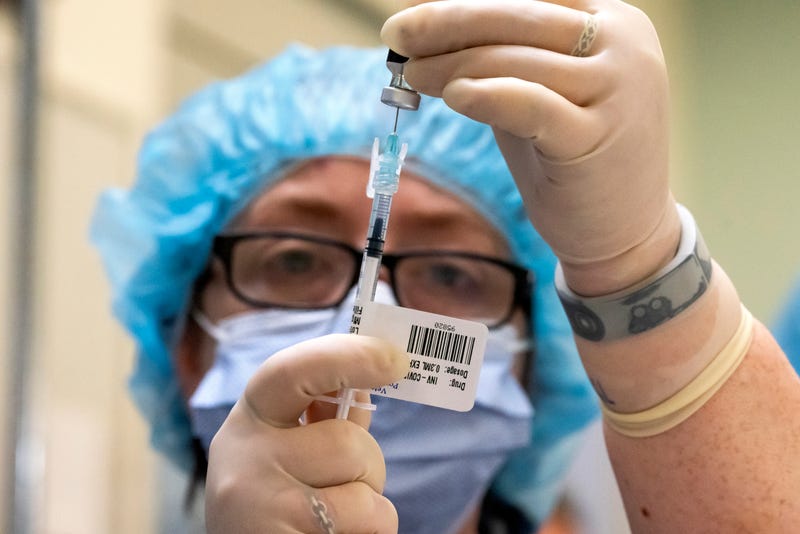
This story originally published Feb. 4, 2021 at 5:45 p.m. EST and was updated on Feb. 11, 2021 at 4:02 p.m.
President Joe Biden's emergency coronavirus response plan includes $17 billion for the Department of Veterans Affairs less than one year after VA received nearly $20 billion from Congress because of the pandemic.
House Veterans Affairs Committee lawmakers approved the section of the Biden administration's overall $1.9 trillion coronavirus emergency relief and response package for veterans on Feb. 11 in a largely party-line vote for the committee often praised for its bipartisan work. Thursday's vote advances that section of the relief package to the House Budget Committee. The relief package still must receive votes on the House and Senate floors before heading to the president's desk to become law.
As part of the Biden administration's $1.9 trillion plan, the White House proposed about $17 billion for VA, the nation's largest healthcare provider which treats about 9 million veterans and has a staff of roughly 400,000. VA, the second-largest federal agency, also serves as America's backup healthcare system in times of crisis, including pandemics -- part of its Fourth Mission.
But that plan caused division among Republicans and Democrats on the Veterans Affairs committee.
Republican leaders of the House and Senate Veterans Affairs committee sent a letter to Acting VA Secretary Dat Tran last week, questioning the plan for additional funding for VA, given the department has yet to use up its 2020 emergency funds. A group of 10 Senate Republicans have countered Biden's plan with a smaller $600 billion proposal. They spoke up in the Feb. 11 committee with the same, seemingly still unanswered concerns.
Ranking member Mike Bost, R-Illinois, called the move "reckless and inappropriate" without further information about why the funds are necessary, how officials came to the $17 billion total and without more details on how the money will be spent.
"With an open mind to learn new facts if more resources are required, we write to you seeking a detailed explanation regarding the Biden administration's proposal to provide VA with an additional $17 billion to respond to the effects of the COVID-19 pandemic," Sen. Jerry Moran, R-Kansas, and Bost, wrote in their letter.
Congress provided $19.6 billion to VA in 2020 to assist in its coronavirus response as part of the CARES Act, and equipped it with the ability to shift the funds around as needed. But so far, the lawmakers said, VA has only obligated about $8.8 billion of that cash as of Jan. 27, leaving it with nearly $10 billion for other needs on top of a record-high $243 billion budget approved for 2021.
Both House and Senate Veterans Affairs committees held multiple hearings last year and asked VA leaders if they needed additional funding to respond to the pandemic.
"We were repeatedly told that between the CARES Act" and the department's approved budget "VA expected to have enough funding to carry out its mission," Moran and Bost wrote. "In fact, (Veterans Health Administration Executive in Charge) Dr. Stone testified before the Senate committee on Dec. 9, 2020, that it was his belief that the remaining emergency funds would be expended 'through the remainder of the fiscal year.'"
Congress also worked with VA to pass legislation to expand telehealth contract, contracted disability exams, GI Bill relief and more.
"Congress and VA have worked collaboratively on needed funding, flexibility and other tools veterans needed from the onset of the pandemic," Moran and Bost wrote. "That is why the $17 billion request is so perplexing."
The lawmakers also argued that it appears the administration is attempting to "rush" the additional funds through Congress, without an explanation of how VA plans to spend its remaining $10 billion from 2020 and coronavirus response money included in its 2021 budget.
"While we stand committed to providing VA with the resources it needs to assist veterans and employees throughout the pandemic ... it is our duty to conduct oversight to ensure accountability and protect veterans and taxpayers alike," the lawmakers wrote, requesting a response and briefing last week.
According to a breakdown provided by committee staff Feb. 11, the $17 billion for VA in the larger emergency COVID-19 response legislation package includes:
- $272 million for VA to mitigate effects of the pandemic on the benefits claims and appeals backlog;
- $13.5 billion for VA healthcare services, including covering delays in care, more expensive care needed because of delays and more veterans who need to rely on VA care because they may have lost their health insurance during the pandemic, as well as expanded suicide prevention, women's health, homelessness and telehealth services.
- $500 million for VA to provide construction funds to state-run veterans homes in states that match funds;
- $100 million for IT system upgrades for supply chain modernization;
- $250 million in one-time emergency payments to support state-run veterans homes, sites of some of the most deadly outbreaks of the pandemic;
- $10 million for the VA Office of the Inspector General for oversight;
- $400 million for up to 12 months of rapid-retraining assistance for up to about 17,250 veterans unemployed because of the pandemic.
When House Veterans Affairs Committee lawmakers attempted to add amendments to the coronavirus legislation package, Chairman Mark Takano, D-California, discouraged them, arguing they could endanger passage of the overall relief package, which includes stimulus payments. Takano said adding to the emergency relief package during the committee's markup could violate instructions from the House Budget Committee. Takano said that the committee will have the opportunity to work toward those suggestions, which included more funding for retraining, oversight, health care, and mental health care.
VA did not respond to a request for comment on the additional funding.
—
Reach Abbie Bennett: abbie@connectingvets.com or @AbbieRBennett.
Sign up for the Connecting Vets weekly newsletter to get more stories like this delivered to your inbox.



